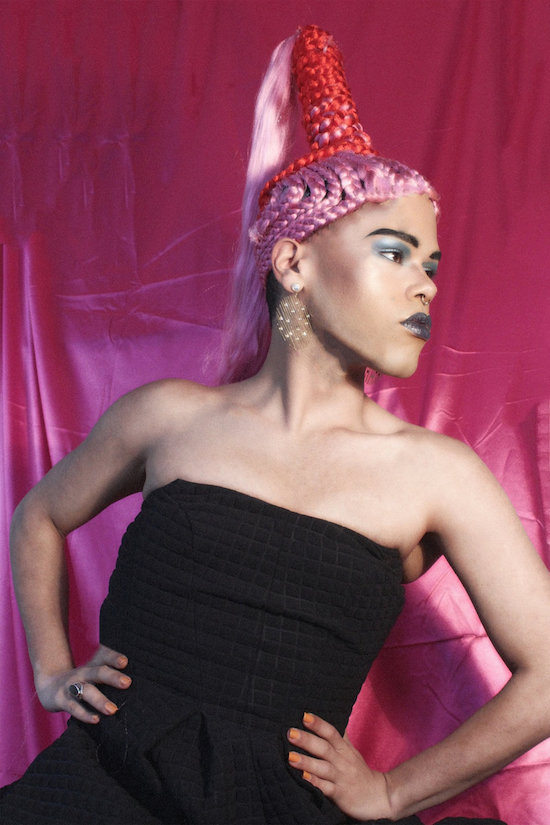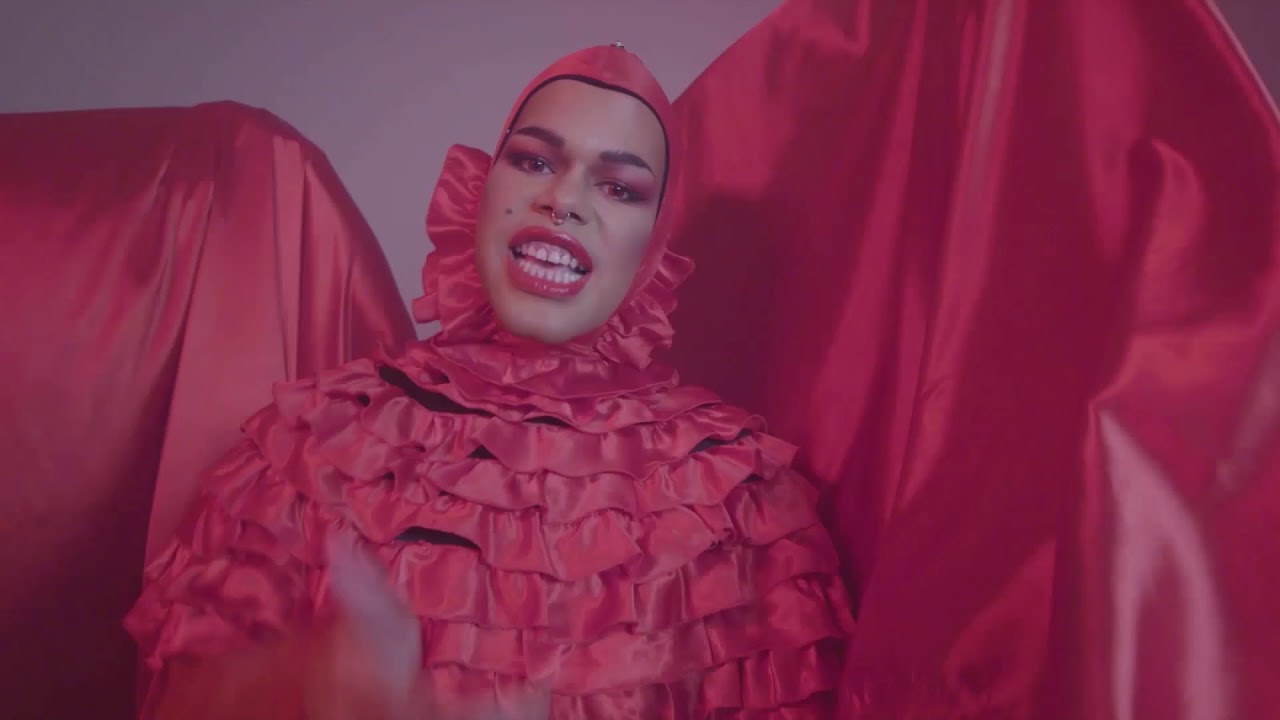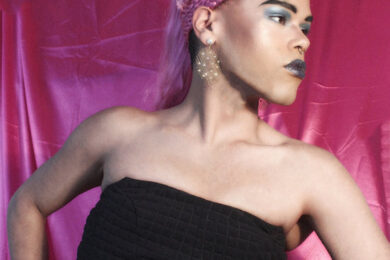For years, Angel-Ho has worked in both the music and art industry as a highly regarded DJ, music producer and founder of the NON Worldwide collective – an experimental underground record label, art project and network dedicated to working with artists of the African diaspora. The South African musician founded the project alongside Richmond’s Chino Amobi and London’s Nkisi and in 2015, Angel-Ho – the childhood namesake of trans artist Angel Antonio Valerio – delivered her first visceral EP Ascension as the label’s debut.
Born and raised in Cape Town, Angel-Ho originally began her creative life fashioning work to soundtrack both film and avant-garde art projects before developing her own sound via DJ and production work, “finding [her] own voice”, as she puts it, after a crucial period of sonic and cultural experimentation. Her first full debut album, Death Becomes Her, was released via Hyperdub last month and is already being heralded as a bold artistic neo-pop creation and pervasive narrative on the fluidity of identity and performative gendered tropes.
It’s also a work that restructures and emancipates the narrative of trans identity from one of transformation, to one of assuming. As Angel-Ho says, “The intent of the title and the drive of the lyrics are a way of ‘killing the old self’ and expressing a poetic way of ‘assuming’ a new identity, ‘assuming’ rather than ‘transforming’ because transformation feels as if something is left behind when in fact my identity is in assuming my trans goddess.”
The album’s art-pop thematic sensibilities are impressive and defy most traditional pop subjects, leaning instead towards the wide-reaching, multi-faceted dialogues of artists like Björk and Missy Elliot. Angel-Ho sings insistently about the urgent need to “demystify” the life many “hide” as she explores the emancipation of trans identities; she also deals candidly and emotively with the violence many trans individuals face, confidently reclaiming a narrative of victimhood to one of victory in the #MeToo era. “No longer beaten and abused / you are the girl that paid her dues / you are the muse,” she raps on ‘Muse to You’; “Coz your body ain’t no object for me to possess / But when we get closer and I get the consent / Safe space, safe sex, no threats, just the best,” she adds on ‘Baby Tee.’
During our interview, Angel-Ho talks us through the continuing aims of her NON Worldwide collective and how its vision has helped bring together a multitude of collaborations on her latest. She also explains her joy at performing live in her famed vibrant performances, sharing with us some of her most favourite recent shows. Perhaps most importantly, Angel-Ho talks of her delight at being at the forefront of her own album proper, no longer a voice in the background or a producer for someone else. As she puts it, “I don’t need to just create an instrumental for some other bitch to sing on, I am that bitch and I’ll sing on it.”
You are one of the founders of the NON Worldwide Collective that has done so much to bring voices from the African diaspora to prominence in areas where they have historically been silenced. Can you tell me more about the aims of the project and how it all began?
Angel-Ho: Well, NON Worldwide started as a collective created by Chino Amobi, Melika Ngombe Kolongo [Nkisi] and myself. We created a beautiful collective where we wanted to showcase the works and the lives of some amazing African artists. We wanted to show that there was no distinguished border between being African and your African-ness or your blackness for that sense. You don’t have to compensate for it because of the categories that the world deems upon people who live outside of Africa and the continent. We really wanted to break the mould when it came to identity and music in order to create a path that was quite a runway for them to just play themselves. That’s basically what NON’s about: it’s rebelling against the norms of cultural oppression.
You also seem to have deliberately chosen collaborators on this album who each have their own distinctive narratives on identity where each has defied performative categorisation in some way, in terms of gendered, sexual or diasporic identities?
AH: Absolutely. The collaboration I did on ‘Baby Tee’ was with K-$ who is a rapper in Cape Town and currently based in Johannesburg. We kind of wanted to create a love story, a romance, a song about romance and falling in love and keeping love and playing with metaphors, keeping it quite poetic with regards to ‘Baby Tee’, meaning like baby trans. It was really cute to keep; you’re spilling the T just a little bit on the track. It was quite a double entendre when it came to different meanings of gay culture and queer culture.
Also, the amazing collaborations that I did with K Rizz – that was for ‘Like A Girl’, my single. That kind of just came about organically, I’ve been an admirer of K Rizz for so long and I just texted her and I was like, you need to get on this track with me. She was so in tune with it and she just pumped out a quick verse for me which was really great. With Asmara, she made me the beautiful R&B beat for me and Baby Caramel, she made the beautiful ‘80s disco, killer pop star beat.
[Working with others] made the album more true to its own identity, being a forward thinking album about life and its wonders, as well as varied gendered and sexual identities. Yet being a singular songwriter, I wanted to express the light and dark side of identity truths too and of course being transgender, I had a lot to say about that.
You’ve done so much in your career to date behind the scenes as a producer – how did it feel to be at the forefront of the process now, releasing your debut album after your previous EPs and mixtapes?
AH: It’s quite wonderful, I must say! It’s quite scary at times too because it’s such a new venture for me, putting vocals away from behind the tracks and now moving to the forefront of the music. It’s giving me a much wider perspective on the music I want to make and what I want to say with my music, the sounds I want to make. It even goes into the fashion of it all and how I want to perform, how I want to present myself to the world. I’m also really having fun exploring my identity in music.
Did the project take you in any surprising directions compared to your previous work?
AH: What took me in a great direction was finding my voice. I found my voice to be able to make this record. I kept pushing it every time on the tracks and I realised that my voice was really powerful and that I could communicate with it even better on a track. I don’t need to just create an instrumental for some other bitch to sing on, I am that bitch and I’ll sing on it.
You’ve spoken previously about how this album is very much about a way of “assuming” a new identity, rather than “transforming” into one, the idea of a “lost identity” or a transformative one being troubling for you. Can you explain why that term was particularly important for you?
AH: We [always seem to] assume people for who they are and in a way, we also have a way of assuming ourselves in that we don’t want to forget our memories, we don’t want to forget who we are as people. So “assuming” for me is quite a strong word when it comes to this because for a lot of trans people, our trans narratives are lost and our queer stories often have this dismal ending with regards to hate crimes or murders. I really wanted to destroy the concept of this.
It was very important for me to explore non-binary concepts within my music because throughout my album, I kind of speak ambiguously about being trans and relating it to the lives of heteronormativity. I relay it in such a way that the narratives are completely trans however, when you listen to it you don’t pick up on that necessarily because I wanted to show a sense of unity between the two worlds.
The album feels like a powerful comment on how so many queer and trans narratives are still so silenced, both in life and art, through invisibility and through violence.
AH: Yes, completely. I really feel like the fashion communities, music communities, the theatre and television communities should support trans artists, support queer and trans artists and their narratives so much more – mostly hiring trans and queer artists to perform queer and trans roles. Those things were so important for me. Watching the Oscars, I was so disappointed that three of the awards were giving to non-queer people playing queer roles: that already for me was a red flag. It’s like they want to just have a good name behind the film, they want to have a good name to carry through the audience and to carry through the film to the box office without thinking about representation.
You reference a lot of female artists on the album including Björk and Britney Spears and you’ve previously spoken about how important artists like Missy Elliot and Lady Gaga are to you. What was it about these artists that made it important for you to explore their work more on your debut album?
AH: Well, first of all they make great fucking music [laughs]. They make music that penetrates my soul and that fills me every day, when I’m feeling low or when I’m suffering from self-doubt – I just play a track and I’m feeling above the clouds. Those choices are my inspirations, they’ve carried me through a lot of the years in my life and they’ve really captured the essence of my own identity within their music, so I very much relate to them.
It was interesting that you referenced Britney’s ‘Gimme More’ on the album as well – you seem to reference moments in artist’s lives that have been particularly challenging for them personally and then counteract that with anecdotes about how they’ve used those moments to re-write their own narratives, emerging stronger…
AH: Yeah. I really wanted to include moments in pop culture that were often moments of being close to death for artists. I really wanted to celebrate those moments in song and music because we need to all realise that our lives are so fragile and that we need to express more love and compassionate towards each other. That’s what I hope to breed in my music. I would consider with regards to pop culture, being in the limelight always comes with such a great privilege…It comes with ideas of no longer being a victim, no longer embracing your self-saboteur – you’re coming out of the dry spell of negativity and now coming into the wall of light. That’s kind of how I would see it in that sense.
Fans have enjoyed how much your live performances have developed over time – what can we expect from them in the future?
AH: My live performances are often very theatrical and they involve a lot of storytelling from the choices of movement to the kinds of tableaus I decide with the choreographer. It’s definitely very collaborative in that sense and very true to the nature of expressing queerness and the art of drag as well.
Angel-Ho began as a performative art practice whereby I would perform performative art pieces, movement pieces with soundtracks and I would often wear bright red-wigs that would trail through to the floor as long waterfall wigs. I would light those on fire and dance in bandages and roses. Then Angel-Ho kind of became a music statement that I wanted to create, exploring political ideas that existed in the world that I thought that I needed to comment on and create sonic narratives for. Then Angel-Ho became a pop diva superstar which is now the journey of Angel-Ho – bringing art, music, pop, theatre, dance, film, television to the forefront of the practice.
The last show that I did – I went on stage while my friend Mighty was performing in Switzerland and I started to chant over the beats: “do you want that dick, dick, dick, dick? Do you want that dick, dick, dick, dick?” [laughs] because I was just like, ‘why not? Everybody loves dick. Why not and why not play with that and have a fantasy about it?’ I was whipping my hair on stage, being a fierce diva, posing, modelling. I was basically throwing my own mini ball, my own solo ball in the middle of it all [laughs].
You’ve also spoken recently about how supportive your community in Cape Town is in embracing sexual identities now – was that different or any more difficult in your childhood as opposed to now?
AH: I wouldn’t say it was difficult because it was my normal but not everybody was openly queer or not everybody was queer growing up in high school. In high school I was often considered to be a freak because I would wear wigs during my high school sessions, I would often just be openly gay and free. My metric partner was a man [laughs] – basically at my prom, my metric date was a man and I really didn’t care what anybody had to say about me at all. That’s true to my parents as well [who were supportive], I’m really grateful for them.
The times are changing and I firmly believe that it’s also changing in my community. My community embraces queerness and transness very openly in Cape Town and we really celebrate it in our big cultural heritage. We have our own Pride which is this weekend.
At least I can be an example [to audiences] and for their parents and for future parenting, you know. I can at least be a living proof that it’s okay to be who you are and to express yourself the way you feel necessary. I want people to feel like everything is okay and there’s nothing wrong. I want everyone to feel the sense of peace.
Angel-Ho’s debut album proper, Death Becomes Her, is out now via Hyperdub. You can purchase it here




